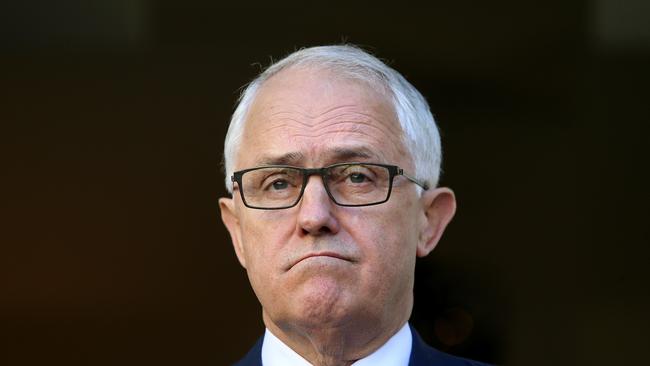Banks bow to the inevitable
The banks have decided enough is enough and are now seeking to put all these issues behind them once and for all.

It became obvious this week that there would be an inquiry after the Nationals and the Greens successfully negotiated the detail of legislation to establish one. Labor, while preferring a Royal Commission of its own making, could have been expected to support them, as would the crossbenchers.
Faced with the prospect of what would be an open-ended exercise in bank-bashing — one designed to provide a forum for bank-bashing with its terms reflecting the full range of the Nationals and Greens’ anti-bank prejudices — the major banks’ chairs and chief executives have sensibly decided they’d fare better if the inquiry were intelligently-framed and conducted at arms-length from parliament.
The letter they wrote to Scott Morison today urged the government to establish a ‘’properly constituted’’ inquiry into the financial services sector — banking, insurance, superannuation and non-banking finance providers — led by an ‘’eminent and respected ex-judicial officer.’’
The terms of reference should be ‘’thoughtfully drafted and free of political influence,’’ its scope should be sufficient to cover the community’s core concerns and, as far as practicable, it should replace other ongoing inquiries.
Malcolm Turnbull and Morrison, despite their previous vehement opposition to Labor’s calls for a royal commission — which caused them to pile impost after impost on the banks to demonstrate how tough on the sector they were — have quickly recognised reality.
There will be a royal commission, Federal Cabinet decided this morning, but it will be on the government’s terms not Labor’s or those dreamt up by the Nationals and Greens. It will be relatively quick — 12 months — cost $75 million and will be overseen by ‘’respected and capable’’ commissioners.
‘’This will not be an open-ended commission. It will not put capitalism on trial, as some people in the Parliament prefer,’’ Turnbull said, describing the government’s embarrassing backflip as ‘’regrettable but necessary.’’
The about-face by the government and the major banks, which had also been fiercely opposed to a Royal Commission or parliamentary commission of inquiry, represented a pragmatic assessment of the situation rather than any acceptance of the need for yet another inquiry into the banks’ behaviours.
It is also an acknowledgment of the increasing harm — reputational and real — that the highly-political debates about the sector was creating. Morrison said today that both the Reserve Bank and the Australian Prudential Regulation Authority had advised him that the speculation about an inquiry was causing damage.
Turnbull and Morrison made it clear that the decision to establish the royal commission was a purely political one, designed to finally truncate the uncertainty and instability that the politicisation of the banks was generating.
As the banks’ letter said, since the financial crisis the major banks have participated in 51 substantial reviews, investigations and inquiries, 12 of them still afoot. Their CEOs are compelled to appear regularly before a parliamentary committee, where they can be quizzed on whatever issue the politicians want to raise.
There has been an enormous amount of re-regulation of the banks, the bank tax surcharge and the now-imminent introduction of the (overly) onerous and punitive Banking Executives Accountability Regime.
There was also, of course, as recently as 2014, the David Murray-led and Joe Hockey-commissioned Financial System Inquiry and the 44 recommendations it made after a comprehensive review of the post-crisis financial sector.
A properly-constructed inquiry/royal commission led by a disinterested chair will probably find that the banks, or rather a relatively small number of relatively low-level people within the banks, are guilty of some sins in the past but that there is nothing much that could be described as systemic.
It will probably also conclude that most, if not all, of the substantive issues that have been identified have been or are being addressed.
That’s not to say that there won’t be some new discrete instances of poor behaviour or breakdowns in the banks’ internal systems identified. These are very large and quite complex organisations employing about 170,000 people and operating on highly complex technology platforms.
They will always make some mistakes regardless of how much effort and investment they put into establishing strong and positive cultures.
What’s important — and a lot of recent effort by the government, the regulators and the banks has been focused on this — is that they identify breaches as quickly as possible and remedy them, and properly compensate anyone adversely affected by them, as quickly and fairly as possible.
At a macro level the major banks have been well-managed. While they did have some of their wholesale borrowings guaranteed by the government during the financial crisis — a guarantee they paid, collectively, billions of dollars for without ever calling on it — that was due to the actions of governments offshore, not to any reckless behaviour by our banks.
Since the crisis the major banks have been required to hold far more capital and high-quality liquidity, including a capital surcharge for being regarded as systemically important that could be regarded as a tax on shareholders for their ‘’too big to fail’’ status.
They are regarded as being among the best-capitalised, most efficient and best-regulated banks in the globe.
S&P Global Ratings this week described the major banks and their regulatory regime as the strongest in the world and said it saw no systematic manipulation of rules and regulations to benefit earnings.
The banks had previously argued that not only was an inquiry unwarranted but that it could be costly, destabilising and destructive.
Establishing an inquiry by itself sends a signal to offshore debt and equity markets that Australian politicians believe there is something systemically wrong within the system and creates the prospect of significant cost and change.
While they have significantly reduced their exposure to offshore wholesale debt markets, the major banks do still raise a substantial proportion of their funding needs in those markets. Uncertainty equals risk and increased risk means an increased funding cost, which would inevitably be passed onto customers and shareholders.
Labor has done a lot of damage to the banks and their reputations by deciding there was political advantage in targeting them.
It created a narrative that the minor parties, and significant elements of the media and the public, accepted and seized upon. That forced the Turnbull government into trying to counter that strategy by piling on more and more intrusive regulation and cost onto the banks. They have become political footballs.
The banks and the government are now saying enough is enough. Have the inquiry, making sure it is properly constituted and its terms of reference aren’t inherently prejudicial.
Get it over and done with and behind the sector once and for all so that their executives and staff can focus on their day jobs at a time when banks are facing challenges from technology-based competitors, are beset by ever more intrusive and costly regulation and the global financial system remains fragile.






Having reluctantly reached the conclusion that a commission of inquiry into the financial sector was inevitable, the major banks have sensibly determined that they’d fare better if the government dictated its terms of reference rather than the unholy alliance between the National and the Greens. The government has reluctantly but sensibly concurred.